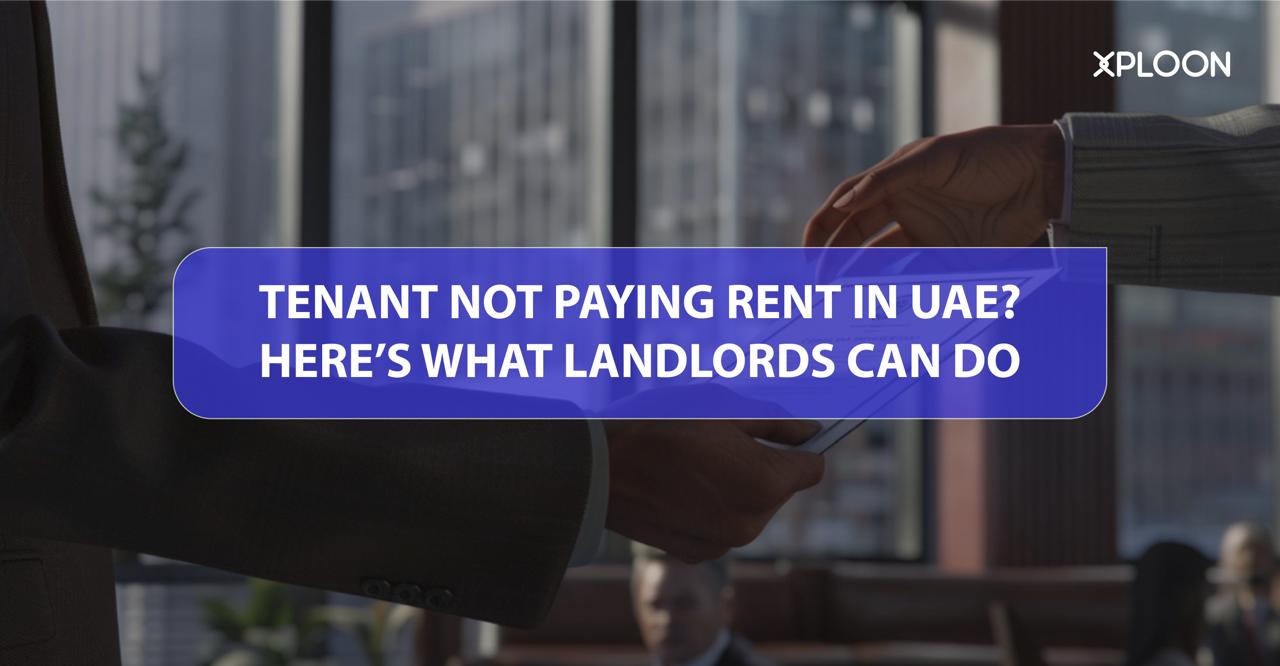
Tenant Not Paying Rent in UAE? Here’s What Landlords Can Do
13-Oct, 2025
Haniya Yashf...
Haniya Yashfeen AThe Guide
If your tenant is not paying rent on time in the UAE, you’re not alone. Many landlords across Dubai, Abu Dhabi, and Sharjah face rent delays or nonpayment issues at some point. But the good news is that the UAE law protects landlords and gives you clear steps to recover your money or legally evict a tenant who refuses to pay.
In this blog, we’ll explain step by step how to handle late rent payments, follow Dubai tenancy law, and take action through the Rental Dispute Settlement Center (RDSC).
What are the laws for default tenancy in the UAE?
Article 25 of the Dubai Tenancy Law gives landlords the right to evict tenants under certain circumstances.
- If a tenant fails to pay rent within 30 days of receiving a legal notice, the landlord can start eviction procedures even before the lease ends.
- Landlords can also file a case with the RDSC to resolve rental disputes and recover unpaid rent.
This law ensures that landlords can protect their investment while following legal procedures.
Legal Ways to Take Action Against Non-Paying Tenants
If your tenant living in a Dubai property doesn’t pay rent on time, the Dubai tenancy law allows you to take the following steps:
- Send a 30-day legal notice to the tenant specifying the overdue rent.
- If the tenant doesn’t respond within 30 days, file a complaint with RDSC.
- If payment is still not made, you can proceed with eviction through the RDSC.
Pro Tip: Always document every step to protect your rights.
Steps to Evict a Tenant
To evict a tenant who is not paying rent, landlords must register for execution proceedings at the Dubai Land Department (DLD) Rental Dispute Centre. The RDSC handles all types of rental disputes, including:
- Eviction
- Monetary claims (recover unpaid rent)
- Lease renewal disputes
The eviction process can be initiated in two ways, both taking roughly one business day to start once documents are submitted.
Filing Online via RDSC Website
If the tenant ignores the 30-day notice, you can escalate the matter to the Rental Dispute Settlement Center (RDSC) under the Dubai Land Department (DLD). Here is the step-by-step guide to file online via RDSC:
- Sign up for an RDSC account and choose the relevant service.
- Submit required documents and receipts.
- Pay the online fees.
- Follow up on the execution judge’s decision.
The electronic requests are processed after 7 days if necessary, and all submissions are tracked online for convenience.
Required Documents for Tenant Eviction
As a landlord, you will need the following documents to evict a tenant:
- Enforcement Writ attested with an Enforcement Stamp
- Security deposit receipt (if available)
- Offer and deposit motion receipts (if applicable)
- Bank statement or letter with IBAN
- Any other documents supporting your claims
After submitting your documents, the RDSC will review your claim and issue a judgment, which may approve eviction, rent recovery, or both. If the court rules in your favor, you can enforce the eviction, recover unpaid rent from the tenant’s bank or assets, or request execution of the judgment if needed.
Note: In Abu Dhabi, similar cases are handled by the Department of Municipalities and Transport (DMT) Rent Dispute Committee.
Service Fees and Payment Methods
Service fees for tenant eviction are mentioned below, which can be paid with either noqodi or debit or credit cards:
- 1% of annual lease amount – AED 5,000 max
- Process service – AED 100
- Power of Attorney registration – AED 25
- Knowledge & innovation fees – AED 10 each
Preventing Tenant Issues
While there’s always some risk of problems with tenants, you can take steps to reduce it.
- Start with a clear tenancy agreement that outlines the terms, conditions, and consequences of not paying rent.
- Screen tenants carefully and maintain a good relationship to avoid disputes.
- Collect post-dated cheques or use digital rent collection platforms
- Always register your lease with Ejari; it legally protects your rights
Prevention is key. A well-written contract and tenant screening can save you from future rental disputes.
Conclusion
In short, dealing with a tenant who doesn’t pay rent can be stressful. To avoid problems, take proactive steps and maintain a professional relationship with your tenants. Know the relevant laws, consult a legal expert when needed, and handle issues promptly. By staying professional, documenting everything, and using the legal system, you can protect your property and recover your rent without breaking the law.
FAQs
1. What to Do If a Tenant Doesn't Pay Rent in Dubai?
In Dubai, landlords must first issue a formal 30-day written notice to the tenant demanding payment. If the tenant fails to pay within this period, the landlord can file a complaint with the Rental Disputes Settlement Centre (RDSC) to seek resolution.
2. What If a Tenant Doesn't Pay Rent on Time?
If a tenant doesn't pay rent on time, the landlord should send a legal notice specifying a 30-day period for payment. Failure to pay within this timeframe allows the landlord to pursue legal action through the RDSC.
3. What Is the Longest You Can Be Late on Rent?
In Dubai, tenants are typically granted a 30-day grace period after receiving a written notice for unpaid rent. If payment isn't made within this period, the landlord can initiate legal proceedings
4. What Happens When a Tenant Fails to Pay Rent?
If a tenant fails to pay rent, the landlord can issue a 30-day notice. If the tenant still doesn't pay, the landlord may file a complaint with the RDSC, which can lead to eviction proceeding.
Get on the list
Don't miss out on the latest updates! United Arab Emirates






















